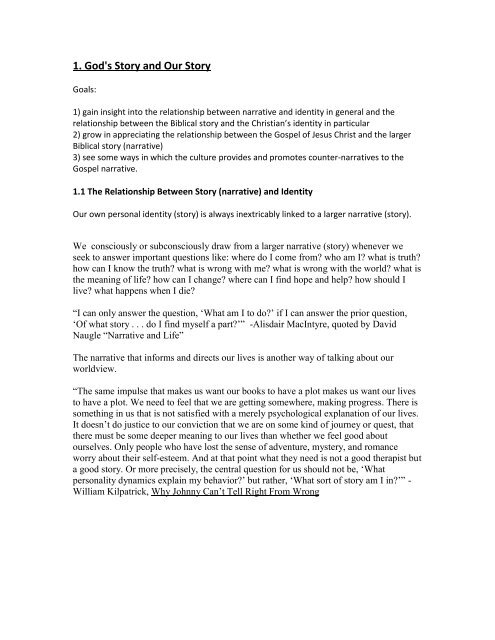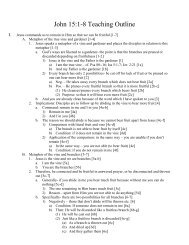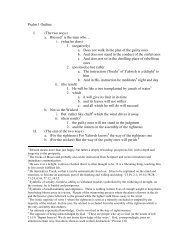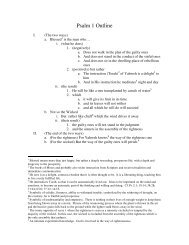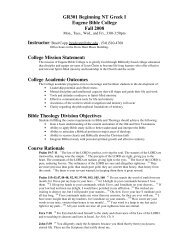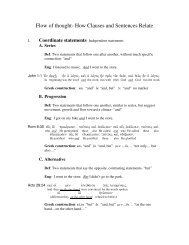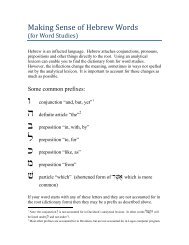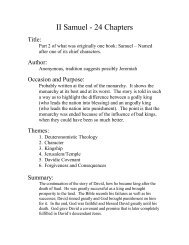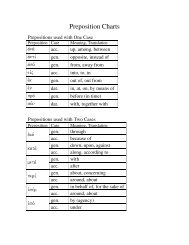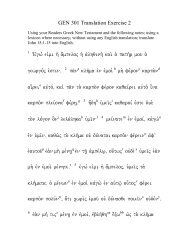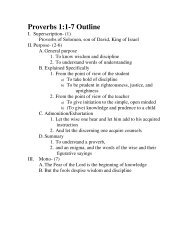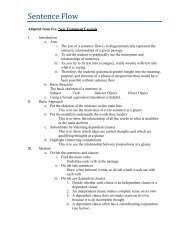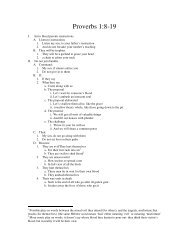God's Story Notes and Quotes - Bradcopp.com
God's Story Notes and Quotes - Bradcopp.com
God's Story Notes and Quotes - Bradcopp.com
Create successful ePaper yourself
Turn your PDF publications into a flip-book with our unique Google optimized e-Paper software.
1. <strong>God's</strong> <strong>Story</strong> <strong>and</strong> Our <strong>Story</strong><br />
Goals:<br />
1) gain insight into the relationship between narrative <strong>and</strong> identity in general <strong>and</strong> the<br />
relationship between the Biblical story <strong>and</strong> the Christian’s identity in particular<br />
2) grow in appreciating the relationship between the Gospel of Jesus Christ <strong>and</strong> the larger<br />
Biblical story (narrative)<br />
3) see some ways in which the culture provides <strong>and</strong> promotes counter-narratives to the<br />
Gospel narrative.<br />
1.1 The Relationship Between <strong>Story</strong> (narrative) <strong>and</strong> Identity<br />
Our own personal identity (story) is always inextricably linked to a larger narrative (story).<br />
We consciously or subconsciously draw from a larger narrative (story) whenever we<br />
seek to answer important questions like: where do I <strong>com</strong>e from? who am I? what is truth?<br />
how can I know the truth? what is wrong with me? what is wrong with the world? what is<br />
the meaning of life? how can I change? where can I find hope <strong>and</strong> help? how should I<br />
live? what happens when I die?<br />
“I can only answer the question, ‘What am I to do?’ if I can answer the prior question,<br />
‘Of what story . . . do I find myself a part?’” -Alisdair MacIntyre, quoted by David<br />
Naugle “Narrative <strong>and</strong> Life”<br />
The narrative that informs <strong>and</strong> directs our lives is another way of talking about our<br />
worldview.<br />
“The same impulse that makes us want our books to have a plot makes us want our lives<br />
to have a plot. We need to feel that we are getting somewhere, making progress. There is<br />
something in us that is not satisfied with a merely psychological explanation of our lives.<br />
It doesn’t do justice to our conviction that we are on some kind of journey or quest, that<br />
there must be some deeper meaning to our lives than whether we feel good about<br />
ourselves. Only people who have lost the sense of adventure, mystery, <strong>and</strong> romance<br />
worry about their self-esteem. And at that point what they need is not a good therapist but<br />
a good story. Or more precisely, the central question for us should not be, ‘What<br />
personality dynamics explain my behavior?’ but rather, ‘What sort of story am I in?’” -<br />
William Kilpatrick, Why Johnny Can’t Tell Right From Wrong
1.2 God’s <strong>Story</strong> <strong>and</strong> Our Identity<br />
“Many people think of the Bible as a book of moral teachings with stories sprinkled through<br />
to illustrate the teachings. But it’s a lot better than that . . . the Bible is a single story with<br />
teachings sprinkled through to illustrate the story.” - Timothy Keller<br />
When we fail to appreciate <strong>and</strong> approach the Bible as God’s unified unfolding story of<br />
redemption, we are in danger of “losing the forest for the trees.” We do this when we<br />
reduce the Bible to: a set of rules or <strong>com</strong>m<strong>and</strong>s to obey, examples to emulate or avoid,<br />
spiritually inspiring texts or stories, practical instruction for living, a theological textbook,<br />
historical background, etc.<br />
The Bible is God’s story - the larger narrative - through which we can find <strong>and</strong> forge a<br />
meaningful identity that transcends the latest cultural fashions, historical circumstances,<br />
<strong>and</strong> personal preferences. Through our faith in Jesus Christ, we are included in God’s story<br />
<strong>and</strong> made participants in God’s redemptive plan<br />
3 Blessed be the God <strong>and</strong> Father of our Lord Jesus Christ, who has blessed us in Christ<br />
with every spiritual blessing in the heavenly places, 4 even as he chose us in him before the<br />
foundation of the world, that we should be holy <strong>and</strong> blameless before him. In love 5 he<br />
predestined us for adoption as sons through Jesus Christ, according to the purpose of his will,<br />
6 to the praise of his glorious grace, with which he has blessed us in the Beloved. 7 In him we<br />
have redemption through his blood, the forgiveness of our trespasses, according to the<br />
riches of his grace, 8 which he lavished upon us, in all wisdom <strong>and</strong> insight 9 making known to<br />
us the mystery of his will, according to his purpose, which he set forth in Christ 10 as a plan<br />
for the fullness of time, to unite all things in him, things in heaven <strong>and</strong> things on earth.<br />
11 In him we have obtained an inheritance, having been predestined according to the<br />
purpose of him who works all things according to the counsel of his will, 12 so that we who<br />
were the first to hope in Christ might be to the praise of his glory. 13 In him you also, when<br />
you heard the word of truth, the gospel of your salvation, <strong>and</strong> believed in him, were sealed<br />
with the promised Holy Spirit, 14 who is the guarantee of our inheritance until we acquire<br />
possession of it, to the praise of his glory. (Ephesians 1:3-14)<br />
28 There is neither Jew nor Greek, there is neither slave nor free, there is no male <strong>and</strong><br />
female, for you are all one in Christ Jesus. 29 And if you are Christ's, then you are Abraham's<br />
offspring, heirs according to promise. (Galatians 3:28-29)<br />
“The single best way of conceiving of faith, <strong>and</strong> of a faithful life, is as a story in which you<br />
are a character. Your life task is to be a character in the greatest story ever told. It is what<br />
you were created for.” - Daniel Taylor “<strong>Story</strong>-shaped Faith”<br />
“If faith were primarily an idea, the intellect alone might be adequate for dealing with it.<br />
Since it is instead a life to be lived, we need story. <strong>Story</strong>, as does life, engages all of what we<br />
are -- mind, emotions, spirit, body. Faith calls us to live in a certain way, not just think in a<br />
certain way. It is no surprise, then, that the central record of our faith in human history
opens with an unmistakable story signature: ‘In the beginning . . .’” -Daniel Taylor “<strong>Story</strong>shaped<br />
Faith”<br />
narrative → identity → behaviour (see Ephesians 2:1-10)<br />
drama → doctrine → doxology → discipleship (Romans 12:1-2)<br />
“Unless we are relocated from the stories of this fading age to our identity in Christ <strong>and</strong><br />
begin to underst<strong>and</strong> the implications of this new script, our discipleship will be little more<br />
than moralism. Merely imitating Christ’s example is different from being united to Christ<br />
through faith, bearing the fruit of his resurrection life. . . . ” – Michael Horton<br />
“Character is formed in relation to convictions <strong>and</strong> is manifested in the capacity to abide by<br />
those convictions even in, especially in, the face of temptation.” - James Davison Hunter,<br />
The Death of Character, viii<br />
1.3 An Overview of God’s story<br />
“Many people know stories from the Bible, but do not know the story of the Bible. That’s<br />
like having a h<strong>and</strong>ful of pearls with no string to link them together.” Colin S. Smith<br />
The gospel only makes sense within the larger biblical narrative (Acts 17:22-34; 1<br />
Corinthians 15:3-5, etc.)<br />
chapter 1 Creation: where did we <strong>com</strong>e from? from God: the One <strong>and</strong> the relational<br />
chapter 2 Fall: why did things go so wrong? sin: bondage <strong>and</strong> condemnation<br />
chapter 3 Redemption: what will put things right? Christ: incarnation, substitution<br />
chapter 4 Inclusion: how can I be put right? through faith: grace <strong>and</strong> trust<br />
chapter 5 Restoration: where am I going? to God: restored presence<br />
“In its dramatic chronicle of the glory of creation, the tragedy of the fall, <strong>and</strong> the love story<br />
of redemption lies [the Bible’s] incalculable power. It is a story that rings true to human<br />
experience. It describes the way things really are. It provides a narrative home in which to<br />
abide. . . . It is the whole story of the Scripture, in place of biblical bits <strong>and</strong> pieces, that has<br />
served to transfigure the life of the believer, providing deeper roots, broader horizons, <strong>and</strong><br />
new <strong>and</strong> exciting perspectives on the sum-total of Christian <strong>and</strong> human experience.” - David<br />
Naugle, “Narrative <strong>and</strong> Life”<br />
“At the crucial moment of choice most of the business of choosing is already over.” - Iris<br />
Murdoch
“In other words, our specific moral decisions are really made far in advance of our actual<br />
choices because of the power <strong>and</strong> influence of a set of previously held attitudes <strong>and</strong> values.<br />
This means that our narrative framework or meaning system to which we have antecedently<br />
entrusted ourselves is determinative for all our subsequent behavior.” - David Naugle,<br />
“Narrative <strong>and</strong> Life”<br />
“Consecutive reading of Biblical books forces everyone who wants to hear to put himself, or<br />
to allow himself to be found, where God has acted once for all for the salvation of men. We<br />
be<strong>com</strong>e part of what once took place for our salvation. . . . It is not that God is the spectator<br />
<strong>and</strong> sharer of our present life, howsoever important that is: but rather that we are the<br />
reverent listeners <strong>and</strong> participants in God’s action in the sacred story, the history of Christ<br />
on earth. And only in so far as we are there, is God with us today also.” - Dietrich<br />
Bonhoeffer, Life Together, 53-4<br />
1.4 God’s <strong>Story</strong> <strong>and</strong> the World’s <strong>Story</strong><br />
The fallen world (1 John 5:19) provides a persuasive <strong>and</strong> plausible (Col. 2:4) counter<br />
narrative.<br />
“Nobody has to be taught the world’s story; we are born into it, as fallen children of Adam.<br />
However, we have to be taught out of it by persistent pastors <strong>and</strong> teachers who know that<br />
we prefer by nature to think differently of God <strong>and</strong> ourselves then the Scriptures require.” -<br />
Michael Horton<br />
2 Cor 10:4-5<br />
“Modernity presents an interlocking system of values that has invaded <strong>and</strong> settled within<br />
the psyche of every person. Modernity is simply unprecedented in its power to remake<br />
human appetites, thinking processes, <strong>and</strong> values. It is, to put it in biblical terms, the<br />
worldliness of our time. For worldliness is that system of values <strong>and</strong> beliefs, behaviors <strong>and</strong><br />
expectations, in any given culture that have at their center the fallen human being <strong>and</strong> that<br />
relegate to their periphery any thought about God. Worldliness is what makes sin look<br />
normal in any age <strong>and</strong> righteousness seem odd. Modernity is worldliness, <strong>and</strong> it has<br />
concealed its values so adroitly in the abundance, the <strong>com</strong>fort, <strong>and</strong> the wizardry of our age<br />
that even those who call themselves the people of God seldom recognize them for what<br />
they are.” - David Wells, God in the Wastel<strong>and</strong>, 29<br />
“The story that has shaped Western culture for several centuries is a narrative of progress<br />
that says we are moving toward ever-greater freedom <strong>and</strong> material prosperity, <strong>and</strong> that we<br />
are doing so by human effort alone, especially through science embodied in technology, <strong>and</strong><br />
in the application of scientific principles to our social life, in economics, in politics, <strong>and</strong> in<br />
education.” – Michael Goheen, Living at the Crossroads, 7<br />
How these alternate stories shape our lives:<br />
1. individualism - self-expression/freedom/
“It is very easy to think that we are living for God, while our personal agenda still rules our<br />
hearts <strong>and</strong> shapes our decisions, words, <strong>and</strong> actions. It is very easy to think that we are<br />
living for the transcendent joy of intimate <strong>com</strong>munion with God, fueled by a personal<br />
enthusiasm for his glory, when in fact we have placed our hope in the shadow glories of this<br />
created world.” Paul David Tripp, A Quest for More, 81<br />
2. therapeutic - “healing”, “wholeness” - “<br />
. . . it confuses our spiritual symptoms (a troubled marriage, anxiety, anger, addictions) with<br />
our spiritual disease (sin). Because the diagnosis is superficial, the treatment is superficial.” -<br />
Trevin Wax, Counterfeit Gospels, 44<br />
“Sin is recast as an obstacle to finding happiness.” Trevin Wax, Counterfeit Gospels, 44<br />
“‘God wants me to be happy’ trumps all the debate over whether it is biblically right or<br />
wrong for a Christian to date an unbeliever. . . . When ‘God wants me to be happy’ be<strong>com</strong>es<br />
the measuring stick for making decisions, we have fallen for a counterfeit [gospel].” - Trevin<br />
Wax, Counterfeit Gospels, 46<br />
“In the end, if low self-esteem is the problem, then therapy is the solution. The question for<br />
Christians then be<strong>com</strong>e: Why do we need Jesus? Why is a bloody cross at the center of our<br />
faith? If our biggest need is to feel good about ourselves, God could have sent Oprah. If our<br />
big need is to get along with our family, God could have sent Dr. Phil. But if God sent his Son<br />
to die a brutal, horrifying death as a payment for human sin, then surely our sin must be<br />
much more heinous than ‘feeling empty inside.’” - Trevin Wax, Counterfeit Gospels, 48<br />
3. prosperity<br />
4. tolerance/pluralism<br />
5. consumerism<br />
6. romanticism<br />
7. hedonism<br />
8. rationalism<br />
9. irrationalism/mysticism<br />
10. naturalism<br />
11. patriotism/nationalism/racism<br />
12. cultural tribalism - fadism/fashion<br />
13. legalism/moralism<br />
14. scientism - power of technology<br />
“Where the world’s great [<strong>and</strong> not so great] stories fail, the gospel story succeeds.<br />
We are part of a story that is about Jesus Christ, the King of the universe. The slain Lamb is<br />
the conquering King -- through whom <strong>and</strong> for whom our world exists. Ironically, when we<br />
live as if our personal story is at the center of our universe, we struggle to find meaning <strong>and</strong><br />
significance. But, when Christ is at the center <strong>and</strong> we are pushed to the periphery -- that we<br />
find true worth <strong>and</strong> value, by giving glory to the crucified <strong>and</strong> risen King with whom we can<br />
be<strong>com</strong>e united through faith.” -Trevin Wax, Counterfeit Gospels, 40-41
Rejecting an alternate story (‘in’ the world’s story but not ‘of’ it)<br />
"Its ok to not be ok, but it is not ok to stay that way"


